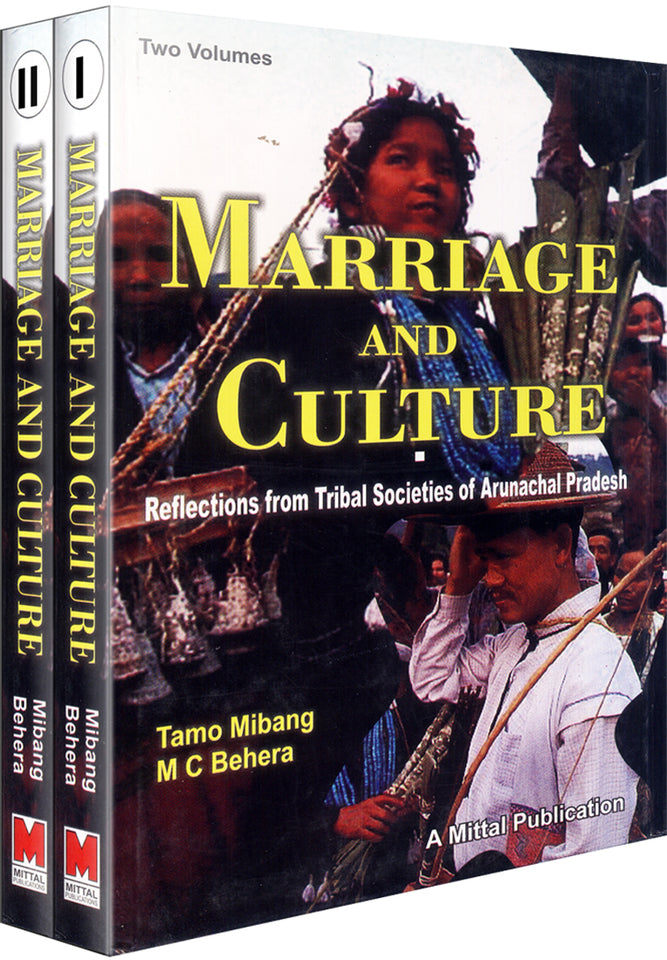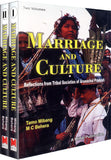Marriage and Culture : Reflections from Tribal Societies of Arunachal Pradesh (Volumes-2)
Regular price
Rs. 1,200.00
Marriage is both culture universal and culture specific; it exists not only in all known cultures, but every culture has defined the system of marriage in a way to get expressions through it. The papers included in this Volume discuss the phenomenon of marriage as embedded in culture. Marriage, no doubt, forms a subset of a culture and thus presents a cultural manifestation, but more significantly it displays interconnectedness with other phenomena of the culture. Arguably, then the chocie for discussion on a single phenomenon, namely, marriage, emanates from the methodological significance that in tribal communities no phenomenon, can be treated in isolation; it exists and functions as an integral part of the total worldview of the community. All the presentations on marriage conform to the above statement and herein lies the strength of this volume. Moreover, most of the papers are emic presentations by scholars trained in an etic system of disciplinary frame and naturally focus on the issue of emic-etic debate. The essence of the papers further lies in that there are commonalities and differences in the marriage practices across the various groups and corroborate the 'psychic unity' of E.B. Tylor at some level. But the differences add new dimensions of understanding to the studies on marriage when concepts like 'bride price', 'widow inheritance' etc. are contested on the basis of empirical findings from many communities. Obviously, the strength of the volume emanates from the attention on the distinct analytical issues and empirical findings in the realm of culture specific social institutions. Notwithstanding this, the papers included in this Volume also initiate a comprehensive exploration of the social dynamics in cross-cultural perspectives. No doubt, the book will come handy among the social scientists in general and students of tribal studies if particular not only in understanding a culture specific phenomenon but also in contextualizing cultural dynamics and methodological issues.
Tamo Mibang ( b. 1955) is now pro-Vice Chancellor, Rajiv Gandhi University, ltanagar, Arunachal Pradesh. He was Head in the Department of Tribal Studies (Presently, Arunachal Institute of Tribal Studies), Rajiv Gandhi University, and Dean, Faculty of Social Sciences from April 1997 to may 2000. He obtained his Master's Degree in History from Guahati University in 1977 and Ph.D from Dibrugarh University in 1988. He has authored Social Change in Arunachal Pradesh (The Minyongs) and Adi Doying and co-authored An Introduction to Adi Language and Indian Folk Tales in North-East India. Besides, he has co-edited Four volumes entitled Arunachal Women and Education, Ethno medicines of the Tribes of Arunachal Pradesh, Dynamics of Tribal Villages in Arunachal Pradesh, Tribal Villages in Arunachal Pradesh-Changing Human Interface, Folk Culture and Oral Literature from North-East India, Understanding Tribal Religion, He has, to his credit, numerous articles on the tribal life of Arunachal Pradesh. He is an Executive Member in many national, regional and state level bodies. Presently, he is also a member of ICHR, New Delhi. His area of interest is regional history and tribal development of North-East India. M.C. Behera ( b.1959), M.A., Ph.D (Economics) from Utkal University, Bhubaneswar, Orissa, is a reputed scholar on Tribal Studies. He has authored / edited / co-edited 14 volumes on socio-cultural and economic (especially related to agriculture), and religius life of tribal and rural people. To his credit, he has about fifty research papers on national and international topics published in various national and international journals /periodicals. He has completed four projects sponsored by ICSSR, New Delhi; UGC, New Delhi; KVIC, Arunachal Pradesh and UNESCO-IGNCA, New Delhi, He is a member of many professional bodies. Presently, he is working as a Reader in Arunachal Institute of Tribal Studies, and holding the post of Director of the Centre for Distance Education, Rajiv Gandhi University, Itanagar, Arunachal Pradesh.
Guaranteed Safe Checkout





